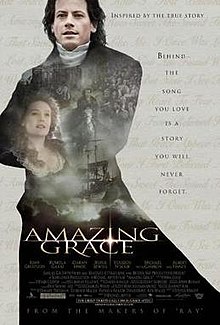Abortion has been much on my mind lately. Between the sensational Kermit Gosnell trial and Texas Senator Wendy Davis's now infamous filibuster, there has been enough news about the controversial topic to keep it in the forefront of anyone's mind. Perhaps that's why when I watched the movie Amazing Grace, I thought about abortion.
 Amazing Grace is a film chronicling William Wilberforce's struggle to abolish the English slave trade in the late 18th and early 19th centuries. I rented the movie because I knew that July was going to be our "grace" month here on the blog (Benedict Cumberbatch's role as William Pitt was only icing on the cake). As I watched the film, searching for evidence of grace, I was instead struck by the similarities between Wilberforce's battle to end the slave trade and the political battle raging today to end abortion.
Amazing Grace is a film chronicling William Wilberforce's struggle to abolish the English slave trade in the late 18th and early 19th centuries. I rented the movie because I knew that July was going to be our "grace" month here on the blog (Benedict Cumberbatch's role as William Pitt was only icing on the cake). As I watched the film, searching for evidence of grace, I was instead struck by the similarities between Wilberforce's battle to end the slave trade and the political battle raging today to end abortion.
I started making comparisons right away. Whenever Wilberforce would stand in Parliament to make an impassioned plea, his colleagues would start to groan. It was clear they had heard all the arguments before, and they were sick of it. I've seen this reaction all too often; I've even been a part of it. When I was at Harding, there was a young lady who was passionate about ending abortion. Each time we had a politician as a speaker, she was one of the first to the microphone, asking a question about abortion. I was not the only one to roll my eyes and wish she would just hush.
I suppose I was tired of hearing it because I believed the political arena was not the place to fight this battle. I still hold firmly that we can save more babies by loving scared, pregnant women. I still believe that picketing abortion clinics doesn't solve any problems. Now, though, I think there is a place for political action. When Wilberforce had his conversion experience, he struggled with a decision. He wanted to know if he should serve God or continue to serve in Parliament. His wise friend William Pitt encouraged him to do both. In both the slave trade and abortion, political action can be just as much a work of God as more personal action.
Just as the slave trade needed to be abolished on a nationwide level, abortion should not be legal. It kills babies. Despite all the talk about rape, incest, and saving the mother's life, the fact remains that those situations account for less than 5% of all abortions. Yes, we should love the women who feel they have no other options. That doesn't change the fact that the law needs to change.
It seems hopeless sometimes. Wilberforce felt overwhelmed too. At the beginning of the movie, he was sick both in body and in spirit. He had worked for 15 years to abolish the slave trade, and it was still going strong. Part of the reason he almost gave up the fight is that war with France broke out. Patriotism was running high, and anyone who opposed the status quo was labeled a traitor. People stopped listening to him.
Pro-lifers are labeled unfairly too. Part of the pro-abortion agenda is to paint anyone who opposes abortion as a woman hater. It doesn't matter that we know that abortion doesn't help women; it only hurts them. It doesn't matter that abortions kill female babies. If I don't support a woman's "right" to kill her unborn child, I must hate women. If I think abortion is wrong, I must hate every woman who has ever had one. The facts aren't important, only the label. It happened in 19th century England, and it happens today.
Thankfully, Wilberforce did not give up forever. The first successful measure he took was actually a kind of back door measure. He had a colleague successfully pass a measure that allowed privateers to capture ships flying neutral flags trading in French ports of call. This would not only help in the war effort with France, but it would almost put a stop to the slave trade as the slave ships often flew a neutral flag.
This kind of side-slipping made me think of many of the laws regarding abortion that are being passed in states around the country. Since abortion doctors often don't have admitting privileges to hospitals, some state legislatures are passing laws that would require abortion clinics to have a doctor on staff who can admit to a hospital. Such a measure would not stop abortion altogether, but it would hopefully slow it down. In fact, it was just such a bill that Senator Davis filibustered in order to stop. The Texas bill would also have made any abortion past 20 weeks illegal.
The case could be made that the slave trade would have ended eventually regardless of the work that William Wilberforce did. That might be true, but someone, somewhere, had to stand up and say, "This is wrong. This should not be allowed." For my part, I am going to be more supportive of those brave people trying to outlaw abortions. Maybe in twenty years it will be abolished as well.
Melissa
Scripture taken from the NEW AMERICAN STANDARD BIBLE(R), Copyright(c) 1960, 1962, 1963, 1968, 1971, 1972, 1973, 1975, 1977, 1995 by The Lockman Foundation. Used by permission.
No comments:
Post a Comment